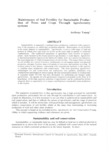Sustainability is essentially continued plant production combined with conservation of the resources on which that production depends. Maintenance of soil fertility is the major element in sustainability. Agroforestry covers a wide range of land use systems in which trees and crops are grown on the same land, in spatial or rotational combinations. The traditional separation of agriculture from forestry is inappropriate : most farmers in the tropics practice agroforestry to some degree. Agroforestry has both productive functions (for fuelwood, fodder, fruit, etc.) and service functions, the most important of which is maintenance of soil fertility. The major effects of trees on soil fertility are control of erosion, maintenance of soil organic matter and physical properties, nitrogen fixation, improved uptake of nutrients, and nutrient recycling. In erosion control a key feature, contrasting with conventional methods, is the capacity to combine plant production with conservation. The most promising agroforestry technologies for soil conservation are multistorey tree gardens, plantation crop combinations and hedgerow intercropping, the last-named particularly on sloping land. A computer model, SCUAF, has been developed, for estimating soil changes under agroforestry. An agenda for soil-agroforestry research is proposed, in the form of 10 hypotheses. If the high apparent potential of agroforestry can be confirmed by further research, there is opportunity for a major contribution to sustainable plant production in the tropics.

